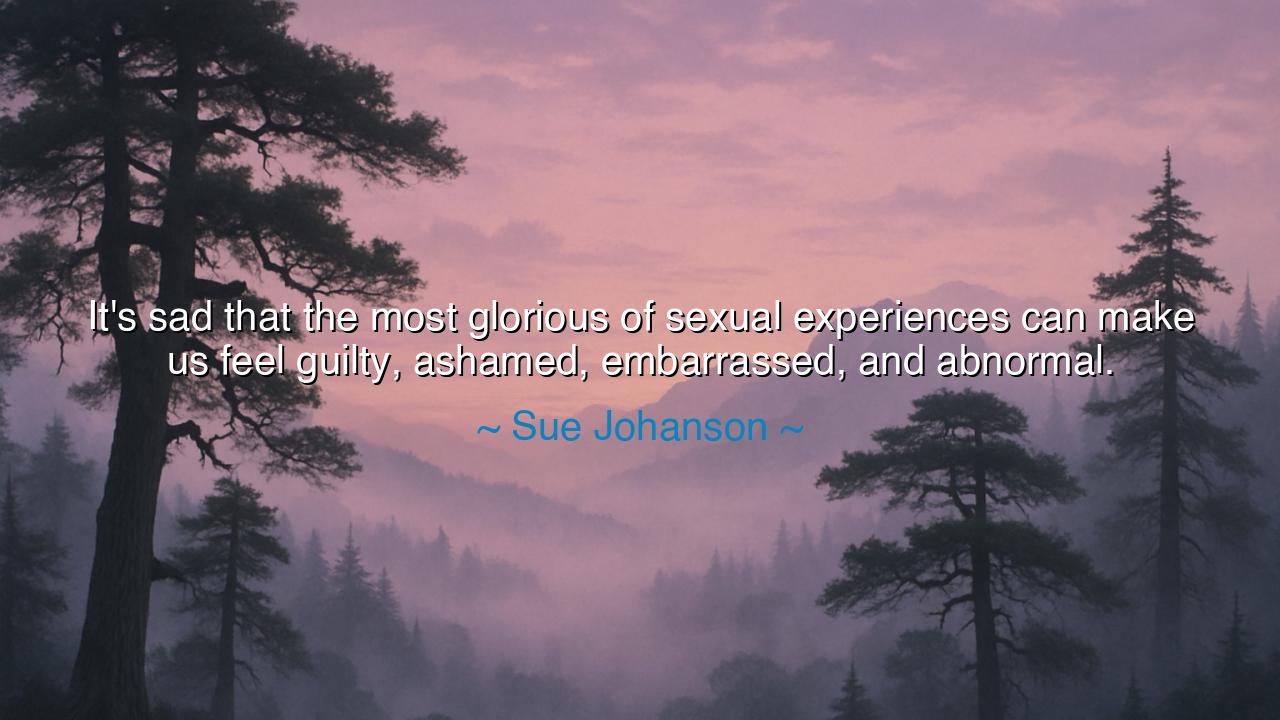
It's sad that the most glorious of sexual experiences can make us
It's sad that the most glorious of sexual experiences can make us feel guilty, ashamed, embarrassed, and abnormal.






There are experiences that should illuminate the soul, yet are often shadowed by guilt and shame. Sue Johanson, the pioneering educator on human sexuality, observed, “It's sad that the most glorious of sexual experiences can make us feel guilty, ashamed, embarrassed, and abnormal.” In these words lies a profound lament: the natural, sacred, and transformative act of human intimacy is too often entwined with societal judgment and internalized fear. What should be a celebration of connection and pleasure becomes a crucible of doubt and repression.
The origin of this sorrow lies in the structures of culture and morality. Across centuries, human societies have governed sexuality with strict codes, often cloaked in fear, superstition, or religious orthodoxy. The ancients themselves, from the Stoics to early Christian thinkers, recognized the tension between desire and restraint. Plato in the Symposium celebrated erotic love as a path to divine understanding, yet the human participants often wrestled with their own societal and personal inhibitions. Johanson’s words echo this timeless struggle: the body’s pleasure is natural, but human judgment can distort it into shame.
Shame and embarrassment often arise not from the act itself, but from the conflict between innate desire and imposed morality. Societies have long dictated what is “proper” or “abnormal,” leaving countless individuals to internalize these rules and feel unworthy of their own bodies and experiences. Johanson laments that what should be glorious is clouded by guilt—a human condition as old as civilization, where natural impulses are treated as dangerous, and joy is made clandestine.
History offers both caution and guidance. Consider Moll Flanders, the heroine of Daniel Defoe’s novel, who navigates desire, survival, and societal censure in a world that judges sexual expression harshly. Despite her resourcefulness and intelligence, she internalizes shame and fear for much of her life, illustrating the enduring psychological toll of societal repression. Johanson’s observation illuminates the psychological reality behind this historical truth: the disconnect between pleasure and acceptance can create unnecessary suffering.
Sexuality, when embraced without shame, can be a source of empowerment and connection. Ancient cultures, such as those in India with the teachings of the Kama Sutra, understood sexuality as a dimension of spiritual and emotional fulfillment, not merely physical release. Pleasure was celebrated, studied, and integrated into broader human flourishing. Johanson’s reflection, by contrast, mourns the modern tendency to sever joy from affirmation, to experience ecstasy and then doubt one’s very normalcy.
The lesson is both practical and profound: guilt and shame are learned, not inherent. By cultivating knowledge, open communication, and self-acceptance, one can reclaim the natural glory of sexual experience. Just as Johanson dedicated her life to educating others, we are called to dismantle false taboos and provide safe spaces for understanding, inquiry, and celebration. Pleasure need not carry stigma; it can coexist with dignity and self-respect.
Furthermore, Johanson reminds us that education and awareness are forms of liberation. To understand one’s body, desires, and responses is to reclaim power from the forces of judgment and repression. Modern initiatives in sexual education, from inclusive curricula to public dialogue, echo this ancient truth: knowledge transforms fear into confidence, embarrassment into mastery, and guilt into acceptance.
Thus, her words guide both reflection and action: honor your experiences, recognize the artificial weight of shame, and seek understanding. Let the glorious moments of human intimacy be celebrated, not vilified. In doing so, we restore sexuality to its rightful place—a natural, enriching, and empowering dimension of human life. To embrace it without fear is to honor both the body and the spirit, and to live fully in the completeness of our humanity.






AAdministratorAdministrator
Welcome, honored guests. Please leave a comment, we will respond soon